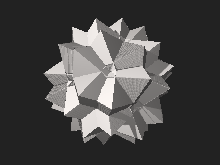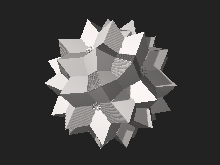Compound of twenty octahedra with rotational freedom
The compound of twenty octahedra with rotational freedom is a uniform polyhedron compound. It's composed of a symmetric arrangement of 20 octahedra, considered as triangular antiprisms. It can be constructed by superimposing two copies of the compound of 10 octahedra UC16, and for each resulting pair of octahedra, rotating each octahedron in the pair by an equal and opposite angle θ.
| Compound of twenty octahedra with rotational freedom | |
|---|---|
 | |
| Type | Uniform compound |
| Index | UC13 |
| Polyhedra | 20 octahedra |
| Faces | 40+120 triangles |
| Edges | 240 |
| Vertices | 120 |
| Symmetry group | icosahedral (Ih) |
| Subgroup restricting to one constituent | 6-fold improper rotation (S6) |
When θ is zero or 60 degrees, the octahedra coincide in pairs yielding (two superimposed copies of) the compounds of ten octahedra UC16 and UC15 respectively. When
octahedra (from distinct rotational axes) coincide in sets four, yielding the compound of five octahedra. When
the vertices coincide in pairs, yielding the compound of twenty octahedra (without rotational freedom).
Cartesian coordinates
Cartesian coordinates for the vertices of this compound are all the cyclic permutations of
where τ = (1 + √5)/2 is the golden ratio (sometimes written φ).
Gallery
References
- Skilling, John (1976), "Uniform Compounds of Uniform Polyhedra", Mathematical Proceedings of the Cambridge Philosophical Society, 79 (3): 447–457, doi:10.1017/S0305004100052440, MR 0397554.

.stl.png)
.stl.png)
.stl.png)
.stl.png)
.stl.png)
.stl.png)
.stl.png)
.stl.png)
.stl.png)
.stl.png)
.stl.png)
